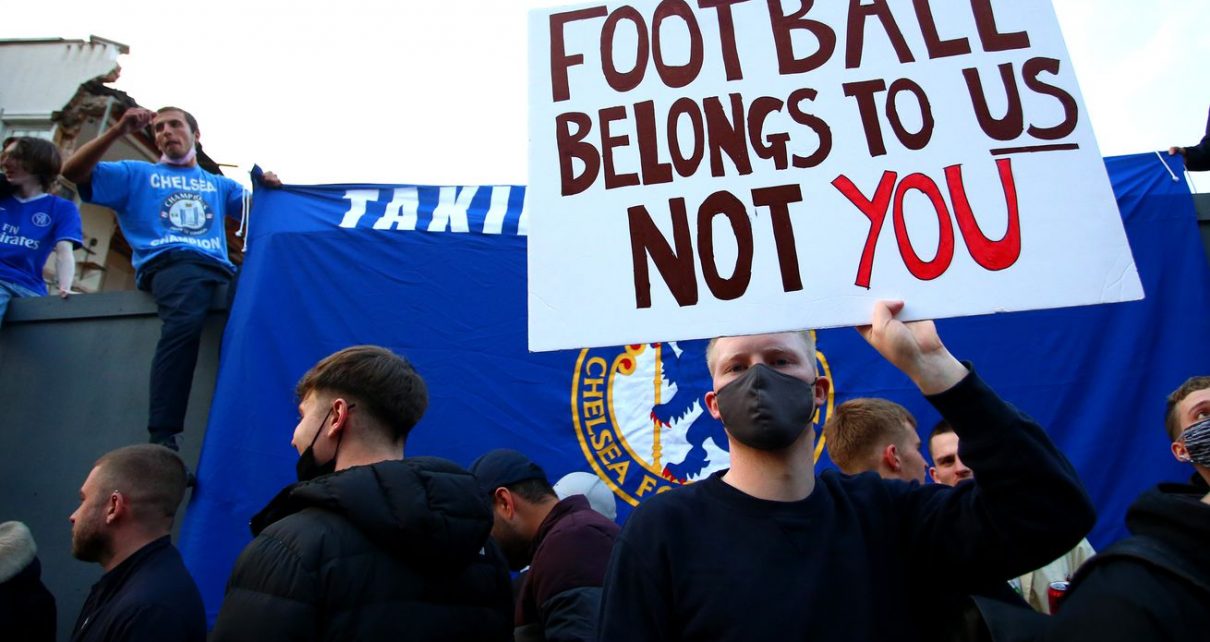
Why soccer fans thought the European Super League super sucked.
Twelve of the richest European soccer teams came up with an ingenious scheme to make even more money: Instead of taking part in a long-standing tournament with poorer and mostly weaker teams, they would create their own exclusive “Super League” to attract global interest, prestige, and cash.
There was just one problem: Fans hated the idea, and their revolt caused what would’ve been the biggest threat to the game in decades to dissipate after just 48 hours.
On Sunday, 12 of the richest teams from England, Spain, and Italy — the richest, mind you, not necessarily the best — announced they would create the European Super League. It would likely replace a more inclusive, pre-existing annual tournament, the Champions League, where the top teams from European countries’ leagues compete to determine the continent’s strongest squad.
Then came the backlash, leading at least six of those 12 teams to back out of the proposal after just two days of relentless fan pressure. The chair of one of them is on the verge of stepping down. And all clubs plan to discuss abandoning the idea, at least for the time being.
As a result of listening to you and the wider football community over recent days we are withdrawing from the proposed Super League.
We made a mistake, and we apologise for it.
— Arsenal (@Arsenal) April 20, 2021
How did such an idea spark so much passion and backlash? After all, who wouldn’t want to see the most prominent clubs play each other regularly? And how did the Super League fall apart so quickly?
Consider this admittedly imperfect analogy: Imagine if the 12 richest NBA teams decided to form their own playoffs, regardless of how they performed during the regular season and without the league’s approval. That wouldn’t be fair to poorer teams who might’ve earned a playoff spot, and also goes against how NBA fans expect things to run.
That’s kind of what happened here. The 12 original teams — AC Milan, Arsenal, Atlético Madrid, Chelsea, FC Barcelona, Inter Milan, Juventus, Liverpool, Manchester City, Manchester United, Real Madrid, and Tottenham Hotspur — wanted to create a top-tier competition they’d all automatically qualify for regardless of their actual on-field performance, and would reap the financial rewards of without having to share any of that revenue with those pesky smaller teams.
The road to the Super League proposal was paved with greed, but also genuine panic caused by declining revenues during the coronavirus pandemic. And other than executives poised to make big bucks, few were happy about the plan. The backlash from fans, current and former players, and football/soccer media was thus fierce.
The idea is “nothing less than the death of football as we know it,” Germany’s leading sports monthly, 11 Freunde, wrote this week. “[It’s] an attempt to turn a sport which millions love, into a weekly circus show in order to squeeze the last shitty cent into the pockets of the superrich.”
That anger — which also came from UK Prime Minister Boris Johnson and French President Emmanuel Macron — led Chelsea, Manchester City, Manchester United, and Arsenal in England, and FC Barcelona and Atlético Madrid in Spain, to swiftly back out of the Super League. What’s more, the chair of Manchester United, one of the teams most strongly pushing for the elite tournament, reportedly will resign on Tuesday under pressure.
/cdn.vox-cdn.com/uploads/chorus_asset/file/22457946/1232402804.jpg) Various/AFP/Getty Images
Various/AFP/Getty ImagesWhile fans were angry at the idea in general, what they were really upset about was that the scheme proved that the decades-long ethos of soccer — a game for anyone and everyone, where prestige is won and lost on the pitch, not bought — isn’t really valued by the executives running things.
“I earnestly felt sick when I heard the news” of the Super League proposal, said Nate Scott, editor of USA Today’s For the Win sports website and fan of Fulham, a middling London team. “European soccer relies on the tenet that ‘anything is possible,’ on any given night you have your chance to upset the giants. It seems like those days are ending.”
For the moment, they’re not. Rarely, if ever, do you see a plan hatched by billionaires fail so fast against the will of the people.
The European Super League was all about money
Financial Times columnist Simon Kuper noted that the idea for a Super League has floated around for decades. On Monday, he cited this passage written by journalist Arthur Hopcraft in 1968: “There was a general expectation a little while ago of what was called a Super League, in which all the leading European clubs would play, breaking away from the domestic leagues in their own countries. It has not materialised.”
On Sunday, it materialized.
So why did it happen now? Experts say the answer is money.
Simply put, the Covid-19 pandemic — and the need to keep people from gathering in large groups, like at, say, soccer stadiums, to prevent the virus’s spread — hit the world’s soccer teams hard, but particularly the biggest clubs.
They’re the ones with the highest payrolls since they have the best, most expensive players; and they’re the ones with the largest, costliest stadiums to maintain. Without fans in attendance because of the pandemic, these teams’ balance sheets sank more and more into the red.
The Champions League — the yearly best-of-Europe tournament run by UEFA, the continent’s governing soccer body — attracts tons of cash for teams in normal times. But these aren’t normal times, and so the body’s ability to help teams cover expenses has dwindled.
UEFA told clubs last October that “nearly $600 million has been lost due to the pandemic, and payouts to clubs will be reduced over the next five seasons,” according to ESPN’s Gabrielle Marcotti at the time.
This is hurting Europe’s richest clubs. Consider the plight of my beloved FC Barcelona, one of the 12 “founding members” of the Super League. Most of its troubles are due to its own gross mismanagement, but the coronavirus didn’t help, which is why it considered creating the tournament in the first place.
A former Barcelona board member told the New York Times in March that the pandemic will cost the club around $500 million in revenue. That’s a problem when the team’s annual salary bill hovers around $770 million, equal to about 74 percent of the team’s pre-coronavirus income.
/cdn.vox-cdn.com/uploads/chorus_asset/file/22457963/1313092281.jpg) Fran Santiago/Getty Images
Fran Santiago/Getty ImagesAnd it gets worse: “In its most recent financial reports, Barcelona announced a loss for the year of $117 million. It estimates that it already has lost $246 million as a result of the pandemic,” the Times reported.
The other teams that wanted the Super League are in similar situations. So instead of relying on the hard-hit Champions League for cash, they decided to create their own league to try to recoup costs as quickly as possible.
The thinking was that a tournament composed of Europe’s top teams will attract more TV contracts and sponsorships, and those teams wouldn’t have to share revenues with UEFA or other smaller clubs who make it into any given year’s Champions League tournament. Within a few years, the goal was to have the Super League replace the Champions League altogether.
That smacked of a plot to make money at the expense of others, a common move by the game’s elite. JP Morgan Chase even committed around $4 billion to get the Super League up and running.
The league’s proponents didn’t exactly hide that that was their true motivation, either. “Here at Real Madrid we’ve lost a lot of money, we are all going through a very bad situation,” the team’s president and Super League chair Florentino Pérez said this week. “When there is no profit, the only way is to play more competitive games during the week. The Super League will save clubs financially.”
The Super League clubs also argued that it would be more fun for fans to watch two famous teams play each other during every round instead of, say, a team from Stockholm, Sweden, against a team from Budapest, Hungary, in the Champions League.
It seems they didn’t actually bother to run that idea past the fans first, though. If they had, they might have avoided the massive public outcry their proposal sparked.
After news of the Super League proposal broke, UEFA President Aleksander Ceferin threatened that any player who participates in the new competition wouldn’t be allowed to represent their national team in tournaments like the World Cup. “UEFA and the footballing world stand united against the disgraceful self-serving proposal we have seen in the last 24 hours from a select few clubs in Europe that are fueled purely by greed above all else,” he said.
It’s unclear if he actually wields such power, experts say. But the threat alone seemed to have been effective. Ander Herrera, a Spanish national team member who previously played for Manchester United, denounced the move as “the rich stealing what the people created.” And Mesut Ozil, who used to play for Arsenal and Germany’s squad, tweeted “Kids grow up dreaming to win the World Cup and the Champions League — not any Super League.”
Kids grow up dreaming to win the World Cup and the Champions League – not any Super League. The enjoyment of big games is that they only happen once or twice a year, not every week. Really hard to understand for all football fans out there…⚽
— Mesut Özil (@MesutOzil1088) April 19, 2021
What is clear is that current and former players, and most importantly the fans, hated that the Super League could become a reality.
Soccer isn’t supposed to be about the money. It’s supposed to be about the game.
While professional soccer started off in the 1800s as a game for the elite, it fairly quickly became a popular game. By popular, I don’t mean famous or trendy, I mean “popular” in the sense that the game was meant for anyone to play and watch.
“The history of these clubs is that they were local, and plumbers would play and fans would support their town,” said USA Today’s Scott. “It was almost a point of civic pride.“
That’s no longer the case. Soccer in recent years has become big business, which is to be expected as it’s the world’s most popular game. Its players, such as Barcelona’s Lionel Messi and Juventus’ Cristiano Ronaldo, are some of the most recognizable and bankable figures in sports. The game’s rise has led to massive endorsement deals, TV contracts, major sponsorships, and multimillion-dollar profits for well-managed clubs.
/cdn.vox-cdn.com/uploads/chorus_asset/file/22457965/1313455871.jpg) Christopher Furlong/Getty Images
Christopher Furlong/Getty ImagesEurope’s strongest leagues thus attracted billionaire investors, many of whom became owners and turned local clubs into ultra-rich international franchises and brands.
Many of these investors didn’t come from the club’s local fanbase, or even the countries where the clubs were located, but rather from places like the US, Russia, and the Middle East. Generally speaking, their main goal was less to give local fans something to be proud of, and more to fund win-at-all-cost machines with global reach revenue streams.
That’s long been a source of conflict. Gary Neville, once Manchester United’s captain and now a commentator for Sky Sports in the UK, railed against this trend during a television hit. “It’s pure greed. They’re impostors,” he said about foreign owners caring only for big bucks. “They’re nothing to do with football in this country … The fans need protecting.”
Gary Neville is the people’s hero right now. Unreal piece of television about the European Super League. pic.twitter.com/ypdQbdQfs7
— Football Tweet (@Football__Tweet) April 18, 2021
This has also long angered local fans, due to an increased gap between the game’s richer and poorer clubs. When the Champions League came around, it was typically the wealthiest clubs competing for the title, because they could buy the best players and managers, while teams with smaller coffers typically failed to go deep in the tournament.
And that, experts note, is why the Super League bothers fans so much. “I know these clubs are always going to be in the Champions League competing for the title anyway,” Scott said. “The deck is already stacked so much in these mega clubs’ favor, so [the Super League] just feels gratuitous, it feels piggish.”
Think about a team like Atalanta from Bergamo, Italy — one of the regions hardest hit early in the pandemic. The club is by no means destitute, but it’s not among the wealthiest, especially compared to those trying to form the Super League. And yet the team made it all the way to the Champion League’s quarterfinals during the 2019-20 season, nearly defeating a superstar-filled side from Paris.
Atalanta’s success became a global story, with the New York Times even covering how the team’s performance gave Bergamo’s faithful something to cheer about. “The suffering of the people mourning for their families cannot be relieved,” Maria Beatrice Stasi, the director general of the Pope John XXIII hospital, told the Times. “Sport cannot overcome that grief. But for the city as a whole, a city that has suffered a lot, it offers hope.”
The creation of a Super League would make a story like Atalanta’s less likely. While the tournament would allow for some non-founding European teams to play in the league, the number of spots for them would sharply decline. In essence, the chance for a dream run — like when a low seed makes it to the Final Four in college basketball — would basically go away.
That strips out what many fans love about the game: that any team on any given day has the chance to beat the big clubs. “That’s what’s leading to my heartbreak,” said Scott. “I should be an adult about this, but I still believe in the fairytale.” His Fulham, after all, once beat mighty Juventus in an international competition, a game that continues to live on in team lore.
Scott clearly wasn’t the only one heartbroken. Even fans of the teams creating the Super League railed against the decision. Outside Anfield, Liverpool’s stadium, fans put up a banner reading “LFC Fans Against Super League.” Current and retired players, including former Manchester United and England national team captain Rio Ferdinand, also decried the move. “It’s a disgrace, it’s a war on football,” he said on British television this week.
And Trent Alexander-Arnold, a star player for Liverpool right now, posted his displeasure with the Super League on Twitter, saying he and others were speaking out “For the fans. For the city.”
For the fans. For the city. https://t.co/JrLav3fhTo
— Trent Alexander-Arnold (@TrentAA) April 20, 2021
That backlash caused the four teams to decide that the trouble of a Super League wasn’t worth the rancor. Chelsea’s fans, after all, blocked the team’s bus as it approached its home stadium ahead of a Tuesday game. It took a club legend, former goalkeeper Petr Cech, to get the crowd to let the bus through.
It seems like the Super League may be dead for now, but there’s always the chance that it could come back. If it does, the defining feature of the sport will die as a new elite league forms — but not if the fans have any say in the matter.




